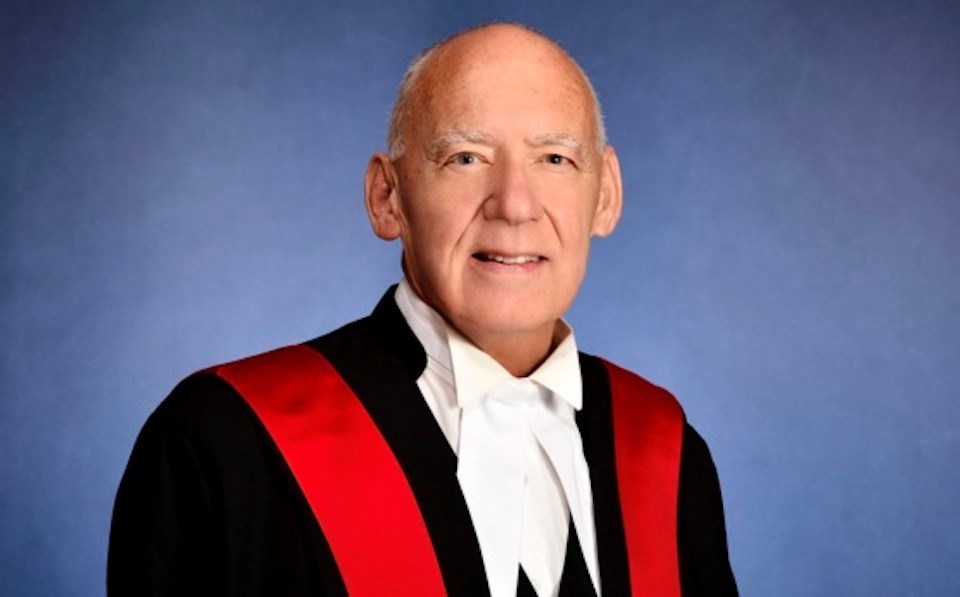A prominent retired judge who once presided over a court that aimed to steer petty criminals from addiction announced Thursday (July 14) that he is opposed to a controversial 13-storey social housing proposal for Kitsilano currently before city council.
Thomas Gove said in a news release that the proposal for a city-owned site that runs a block long between Seventh and Eighth avenues at Arbutus Street is the “wrong model, the wrong size and in the wrong place” and that residents could expect more police calls and an increase in crime.
Gove spearheaded the creation of the Downtown Community Court in the Downtown Eastside, where his decisions helped link drug-addicted offenders to services and programs to address the problems that cause their criminal behaviour.
“I worked in the Downtown Eastside for more than 25 years, including 14 years at the community court, and the model being proposed for 7th/8th and Arbutus does not work, particularly when there is no treatment that is tied to housing,” Gove said.
“At the same time, the building and the number of units proposed is simply too big to be anything more than a serious problem for the people living in the building and the people living in the neighbourhood.”
Added Gove: “Pretending otherwise, or trying to gloss things over, just reinforces the failure of the current system, whether it is in the Downtown Eastside, or any other neighbourhood in Vancouver. The right kind of housing, with the right treatments and support services, is what we should be pushing for as citizens of Vancouver, but that’s not what is being presented to the folks in Kitsilano.”
MLA George Heyman among project supporters
If council approves the project, each of the 129 studio apartments would go to a combination of people without homes, at risk of homelessness or those displaced from low-income housing, as well as citizens who may be working and earning low incomes.
“Approximately half of the units would be operated as supportive housing with on-site and embedded support services for residents and the other half will be deeply affordable social housing for residents who are ready and able to live more independently,” according to a city staff report.
Supportive housing means tenants who need it will have access to mental health care, substance use services that could include a safe consumption room, education, life-skills training and help accessing income assistance, disability benefits and pensions.
Vancouver-Fairview MLA George Heyman, Margaret Pfoh of the Aboriginal Housing Management Association and the nonprofit Women Transforming Cities have all publicly announced their support for the project.
The public hearing for the proposal resumes Thursday afternoon, with council expected to hear from speaker number 117 of 283 people registered. Gove is 274th on the list, 18 speakers after Dr. Julian Somers, who Gove refers to in his release.
Kitsilano Coalition opposes the controversial project
Somers teaches at Simon Fraser University and is a clinical psychologist and international expert on public policies related to addiction and mental health. He too was featured in a separate news release by the same public relations firm, Pace Group, which has issued several releases on behalf of the Kitsilano Coalition, which formed to oppose the project.
“[Somers’] findings and data, and the real-life examples I saw every day at the community court, reinforce that if you congregate people with these sorts of serious problems into one building you are simply importing the culture of the street into their building, and that doesn’t help the residents or the neighbourhood,” Gove said.
“At the same time, the neighbourhood needs to understand that while the building might have 129 units, you can count on the people living there to have others staying with them, which means doubling the occupants coming and going from the building. We see that all the time in the Downtown Eastside, it’s just a fact of life for a building like that, and you can expect it at the proposed project in Kitsilano as well.”
Homeless population in Vancouver likely increased due to pandemic
If approved, approximately 50 per cent of the units would rent at the $375 per month shelter component of income assistance.
The balance of the units would rent at rents-geared-to-income from $375 up to an income limit of 50 per cent of BC Housing Income Limits — currently $28,750 per year gross household income and a rent of $719 per month.
Vancouver last conducted a homeless count in March 2020 and found 2,095 people were without a home. City staff has since said the pandemic and other factors may have increased the homeless population across the city.
@Howellings




